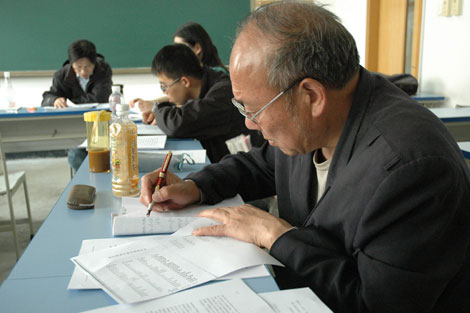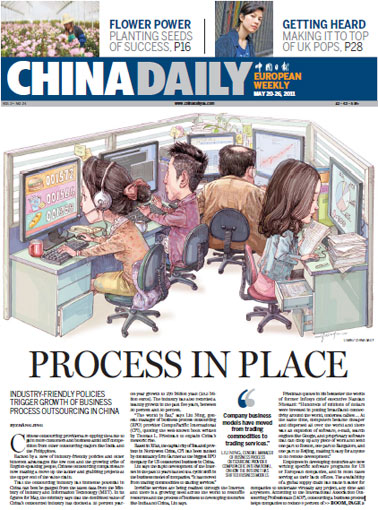Society
Thirst for knowledge
Updated: 2011-05-24 07:54
By Liu Xin (China Daily)
|
Li Wenchao takes notes in a Greek philosophy class at Tsinghua University. Li, 69, from Guizhou province, is a casual student at Tsinghua. Liu Xin / For China daily |
Among Tsinghua University's cohort are casual students who clock many hours of classes a week and know there is going to be no degree or diploma to show for it. Liu Xin from China Features reports.
His frayed shirt and shabby trousers are not the only reasons Li Wenchao stands out in the Greek philosophy class at Beijing's Tsinghua University. The man assiduously noting down every word the professor says is also 69 years old and not even a registered student. Li, who is from Guizhou province, joined Tsinghua as a casual student in November 2010. He takes nine courses, mostly PhD-level ones, to clock a total of 23 hours each week. His favorite subjects are Greek and German philosophy.
Casual students like Li can sit in on any class of their choice. All they need is a nod from the professor teaching that subject.
The son of a peasant couple recalls how his parents moved from a hilly poor area on the north bank of the Yangtze River to the south so he could attend school. "They always emphasized the importance of knowledge," he says.
His wife, Xu Changhong, 60, says it was his studiousness that attracted her to him.
"He worked as a technician with the Guiyang branch of Guizhou's railway bureau, and would always enroll in part-time courses, like evening college and weekend school," Xu recalls.
In 2001, Li, who had already retired, passed China's college entrance examination and was enrolled by Guizhou Normal University as a senior examinee.
After earning a bachelor's degree in contemporary Chinese in 2005, he took the entrance examination for graduate school but was turned down by Shanghai Normal University because of a low score of 22 in English.
But Li was not ready to let go of his dream, although he didn't think he could ever pass the English exam. According to the Education Ministry, English and politics are mandatory for candidates taking the entrance exam to graduate school.
Every college or university sets its own score requirements for passing these courses. "Last year, Tsinghua required a passing grade of 50 in English and politics," says Altenod, a graduate student of architecture at Tsinghua. Altenod, who is from the Inner Mongolia autonomous region, takes the Greek philosophy class with Li.
Besides his wife, Li has left behind two sons, both older than 35 and unemployed, in Guizhou.
He spends 3 to 5 yuan (46-77 US cents) a meal in the student canteen of Tsinghua. His simple breakfast - just a baked corn-flour pancake - costs 0.8 yuan.
"Soft drinks or milk are a luxury," he says.
Carrying a reusable plastic bottle filled with water for tea, he rides his 50-yuan second-hand bicycle to Tsinghua every day from his rented room in a nearby basement inn.
"I share this 10-square-meter room with two people who are hunting for jobs in Beijing. It costs me 400 yuan ($62) a month just for the bed," he says.
Although Li now has more than 700 pages of detailed study notes, none of it is going to eventually earn him a degree or even a diploma.
When asked whether he envies the lifestyles of other men his age, Li says he feels the same happiness studying as a man playing soccer with his grandson.
He knows his studies are not going to make any difference to his life but is emphatic that education is the key to a better future for young people.
He even hopes for a chance to study abroad after completing his studies at Tsinghua.
"I have no time to lose at my age, so I have to seize every day," Li says.
Yu Yunkai, a 28-year-old from a small village in Yunnan province, is also a casual student who came to Peking University to study literature four years ago. He has two hours of class every day.
He works for a magazine as a part-time editor and submits articles to periodicals to pay for his expenses.
His job cannot make ends meet, so his younger sister, a migrant worker with a 2,000-yuan monthly salary in a garment factory in Zhejiang province, periodically lends him money.
He has been writing poetry and essays since he was 15 and submitting them to local newspapers. Encouraged by their acceptance, he dropped out of his technical secondary school and came to Beijing.
"I attend those classes that I am interested in," Yu says "I believe that whatever I absorb here can only benefit my future writing."
Casual students, such as Li and Yu, assess their progress by doing homework, although professors are not obliged to check their work. "I submit my literature homework to magazines, while my classmates give theirs to professors," Yu says.
Unlike Li and Yu, 28-year-old Wang Xiaobing, who left the Inner Mongolia in 2006 to study as a casual student in Beijing, was enrolled by Minzu University in 2007, after a year of attending classes in Chinese contemporary literature.
Three years later, armed with a master's degree, he received an offer for doctoral studies by the Chinese University of Hong Kong on a part scholarship.
Associate professor Song Jijie of Tsinghua University says he encourages such students.
"They have a stronger thirst for knowledge and the willingness to study hard," Song says.
Zhang Xinggen, former director of the executive office of the Department of Chinese Language and Literature in Peking University, says it is difficult to provide an estimate of their numbers in the university at any given time.
"They disappear if they are not interested in the course."
Zhang also denies that their presence can influence the seats open for regular students.
"Enough seats are vacant in most cases, so it doesn't matter if there are several such students among the registered ones."
E-paper

Thawing out
After a deep freeze in sales during the recession, China’s air conditioner makers are bouncing back
Cool Iron lady
Of good and evil
Build on security initiatives
Specials

Memory lanes
Shanghai’s historic ALLEYS not just unique architecture but a way of life

Great expectations
Hong Kong-born singer songwriter rises to the top of the UK pops.

A diplomat of character
Belgian envoy draws on personal fascination to help build China ties.

